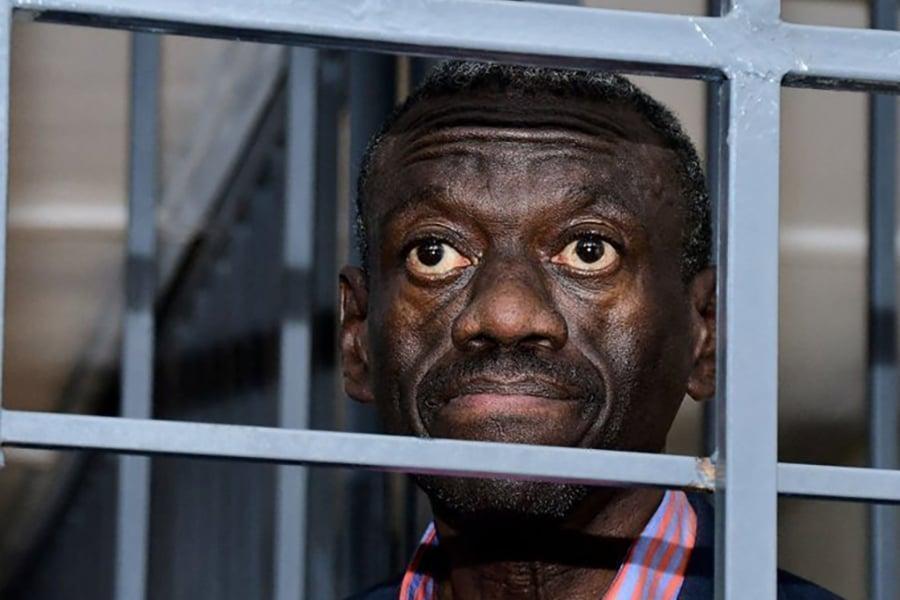Africa-Press – Uganda. In Uganda’s fraught political landscape, where dissent is often swiftly suppressed, Dr Kizza Besigye stands as a paradox.
Detained at Luzira Maximum Security Prison on yet another treason charge, the four-time presidential candidate continues to loom large over the nation’s political consciousness.
Far from diminishing his influence, incarceration has elevated Besigye’s profile—transforming him from a political contender into a living symbol of resistance and an enduring beacon for those demanding change.
Now nearly seven months into detention, Besigye’s political fire burns stronger. The defiance he inspires has spilled onto the streets—and into the arts.
His supporters have launched waves of solidarity, crafting songs and chants to amplify his cause.
The latest anthem, Besigye Mulwanyi (Besigye is a Fighter), echoes with the spirit of We Shall Overcome, serving as a national soundtrack for resilience and defiance.
But Besigye’s influence transcends symbolic gestures. He has become the face of unwavering resistance against President Yoweri Museveni’s long-standing rule.
According to Kampala Lord Mayor and interim president of the newly registered People’s Front for Freedom (PFF), Erias Lukwago, Besigye’s unshakable resolve has become a moral compass for the opposition.
“He works in the interest of the people. The consistency and willingness. Authenticity moves with him,” Lukwago said in an interview.
He added that the government’s continuous clampdown has ironically “kept Besigye’s leadership candle burning,” inspiring new generations disillusioned by the status quo.
Indeed, Luzira Prison has become more than a place of confinement—it now functions as an unofficial command center for Uganda’s opposition.
High-profile figures, including National Unity Platform (NUP) leader Robert Kyagulanyi (Bobi Wine), regularly visit Besigye, transforming the prison into what Lukwago described as a “semblance pilgrimage site for the opposition.”
Even behind bars, Besigye holds symbolic sway, officially listed as party member number 001 in the PFF, which was formally registered on June 5, 2025.
This phenomenon is not new to Besigye’s political journey. In 2001, he was nominated for the presidency while in prison on collapsed rape charges.
Legal persecution has become a recurring motif in his life—a fact that only amplifies his appeal.
Each arrest and courtroom appearance reinforces the image of a man targeted for challenging entrenched power.
Wandera Ogalo, a seasoned lawyer and former member of the Constituent Assembly that drafted Uganda’s 1995 Constitution, explained how this cycle of repression has backfired.
“The continuous oppression against Besigye has made supporters hold onto him, for many see him as their representation,” he noted.
He further pointed out that “State institutions have had a role in the Besigye grip on opposition support,” indicating that the perceived weaponization of the judiciary has only cemented public empathy and loyalty.
With the 2026 elections looming, Besigye’s eligibility remains a topic of strategic debate.
Lukwago describes the decision on his candidacy as “a matter under discussion,” while PFF’s Salaam Musumba was more forthright: “We do not rule out Besigye’s candidature. The choice lies not with Besigye, but with the mission of change seekers.”
Her remarks suggest that while Besigye remains central, the party is preparing for various political scenarios, including the possibility of fielding another candidate.
Legally, Besigye’s path to the presidency—even from a prison cell—remains open. Ogalo asserted that “with the current status quo, nothing bars the opposition leader from being elected President of Uganda.”
He emphasized that being on remand does not equate to guilt. “If elected, Besigye is immune to criminal proceedings,” Ogalo added, citing Article 98 of the Constitution.
“A president assumes office 24 hours after the term expiry,” meaning that the legal machinery allows for an imprisoned candidate to be sworn in—provided the people choose him.
Dr. Besigye’s continued imprisonment has thus evolved into something far more profound than a legal saga.
It has become the crucible through which his political identity is being refined. In a nation where power is closely guarded and opposition often criminalized, his resilience represents not just survival—but sustained relevance.
His story is no longer merely about contesting elections; it is about redefining leadership in an environment where the struggle itself has become the platform.
As the 2026 campaign season gathers momentum, one thing remains clear: whether inside a courtroom, a prison cell, or on a ballot paper, Kizza Besigye’s presence will loom over Uganda’s political future.
He may be behind bars—but his grip on the opposition remains unbreakable.
Source: Nilepost News
For More News And Analysis About Uganda Follow Africa-Press






